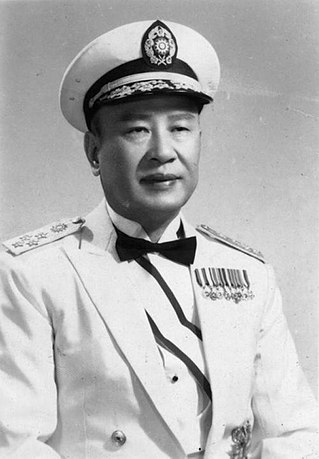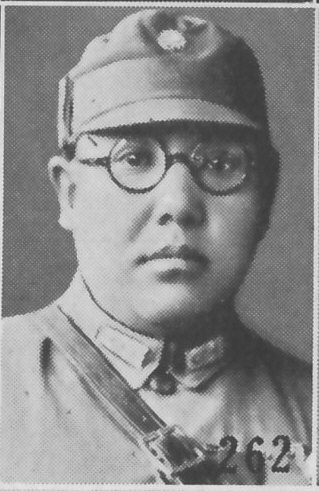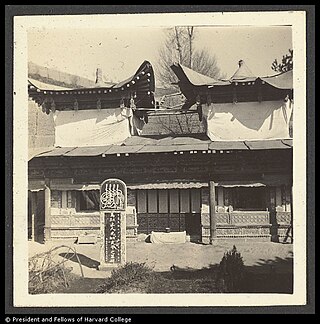Related Research Articles

The Hui people are an East Asian ethnoreligious group predominantly composed of Chinese-speaking adherents of Islam. They are distributed throughout China, mainly in the northwestern provinces and in the Zhongyuan region. According to the 2010 census, China is home to approximately 10.5 million Hui people. Outside China, the 170,000 Dungan people of Kazakhstan and Kyrgyzstan, Panthays in Myanmar and many of the Chin Haws in Thailand are also considered part of the Hui ethnicity.

Bai Chongxi was a Chinese general in the National Revolutionary Army of the Republic of China (ROC) and a prominent Chinese Nationalist leader. He was of Hui ethnicity and of the Muslim faith. From the mid-1920s to 1949, Bai and his close ally Li Zongren ruled Guangxi province as regional warlords with their own troops and considerable political autonomy. His relationship with Chiang Kai-shek was at various times antagonistic and cooperative. He and Li Zongren supported the anti-Chiang warlord alliance in the Central Plains War in 1930, then supported Chiang in the Second Sino-Japanese War and the Chinese Civil War. Bai was the first defense minister of the Republic of China from 1946 to 1948. After losing to the Communists in 1949, he fled to Taiwan, where he died in 1966.

Islam has been practiced in China since the 7th century CE. There are an estimated 17–25 million Muslims in China, less than 2 percent of the total population. Though Hui Muslims are the most numerous group, the greatest concentration of Muslims reside in northwestern China’s Xinjiang autonomous region, which contains a significant Uyghur population. Lesser yet significant populations reside in the regions of Ningxia, Gansu and Qinghai. Of China's 55 officially recognized minority peoples, ten of these groups are predominantly Sunni Muslim.

Ma Hongkui was a prominent Muslim warlord in China during the Republic of China era, ruling the province of Ningxia. His rank was lieutenant general. His courtesy name was Shao-yun (少雲). In 1950, Hongkui migrated to the United States, where he lived until he died in 1970.

Ma Bufang (1903 – 31 July 1975) (traditional Chinese: 馬步芳; simplified Chinese: 马步芳; pinyin: Mǎ Bùfāng; Wade–Giles: Ma3 Pu4-fang1, Xiao'erjing: مَا بُفَانْ) was a prominent Muslim Ma clique warlord in China during the Republic of China era, ruling the province of Qinghai. His rank was lieutenant-general.

Ma Hongbin, was a prominent Chinese Muslim warlord active mainly during the Republican era, and was part of the Ma clique. He was the acting Chairman of Gansu and Ningxia Provinces for a short period.

Ma Fuxiang was a Chinese Muslim scholar and military and political figure, spanning from the Qing Dynasty through the early Republic of China. His positions illustrated the power of family, the role of religious affiliations and the interaction of Inner Asian China and the national government of China. A prominent Muslim warlord in northwest China, Ma Fuxiang originally served under Dong Fuxiang, like other Ma Clique Muslim warlords such as Ma Anliang.

Ma Buqing (1901–1977) was a prominent Ma clique warlord in China during the Republic of China era, controlling armies in the province of Qinghai.

During the Manchu-led Qing dynasty (1644–1912), Islam was a significant religion in Northwestern China and Yunnan. There were five major Muslim rebellions during the Qing period. The first and last rebellions were caused by sectarian infighting between rival Sufi Muslim orders.

Dongguan Mosque is a mosque in Xining, Qinghai Province, China. It is the largest mosque in Qinghai.

Chinese people in Egypt form one of the smaller groups of overseas Chinese; however, they are a very diverse community with a history reaching back for over a century.

Hu Songshan (1880–1955), a Hui, was born in 1880, in Tongxin County, Ningxia, China. His Muslim name in Arabic was Sa'd al-Din. Although he was born Sufi and turned Wahhabi, he changed his views and turned his back on Wahhabism after a Hajj to Mecca and later became an important imam, scripturalist, and leader of the Yihewani Muslim sect in China. He was influential and played an important role in Chinese Islam in this position as he propagated reformist doctrines in Ningxia in his later life. Hu also played a role in rallying Muslims against the Japanese invasion of China.
Yihewani, or Ikhwan, is an Islamic sect in China. Its adherents are called Sunnaiti. It is of the Hanafi school, one of the four major schools of Sunni Islam. It is also referred to as "new teaching" or "latest teaching". Ikhwan (Yihewani), together with Qadim (Gedimu) and Xidaotang, are the three major sects of Islam in China. The Yihewani sect was labeled as the new teaching (xinjiao). In 1937 it divided into two groups.

Ma Qixi, a Hui from Gansu, was the founder of the Xidaotang, a Chinese-Islamic school of thought.
Tang Kesan was a Chinese Muslim. In Xikang province during the Sino-Tibetan War Tang Kesan represented the Kuomintang.

Ma Yuanzhang was a Chinese Sufi master, of the Jahriyya menhuan.
Ma Bukang was a Chinese Muslim General and warlord and a member of the Ma Clique. Ma Bukang led a military force around Gansu in the Republic of China. His nickname was Little Big Horse. He controlled western Gansu after his cousin Ma Zhongying disappeared and left it vacant.

Ma Hu-shan was a Hui warlord and the brother-in-law and follower of Ma Zhongying, a Dungan/Hui Ma Clique warlord. He ruled over an area of Southern Xinjiang, nicknamed Tunganistan by Westerners, from 1934 to 1937.

Ma Zhongying, also Ma Chung-ying, nickname Commander Ga, was a Hui Chinese Muslim warlord during the Warlord era of China. His birth name was Ma Buying. Ma was a warlord of Gansu Province in China during the 1930s. His alliance with the Kuomintang (KMT) brought his predominantly Chinese Muslim troops under the control of the KMT as the New 36th Division with Ma Zhongying as its commander. He was ordered to overthrow Jin Shuren, the governor of Xinjiang. After several victories over provincial and White Russian forces, he attempted to expand his territory into southern Xinjiang by launching campaigns from his power base in Gansu, but was stopped by Xinjiang warlord Sheng Shicai with Soviet support in 1934.

Rafīq Bey ibn Mahmūd al-ʿAzm was a Syrian intellectual, author, and politician. 'Azm served as the president of the Ottoman Party for Administrative Decentralization and was a key figure in the intellectual formation of Arabism.
References
- ↑ M. Rafiq Khan (1963). Islam in China. Delhi: National Academy. p. 17. Retrieved 2010-06-28.
- ↑ M. Rafiq Khan (1963). Islam in China. Delhi: National Academy. p. 17. Retrieved 2010-06-28.
- ↑ Stéphane A. Dudoignon (2004). Devout societies vs. impious states?: transmitting Islamic learning in Russia, Central Asia and China, through the twentieth century : proceedings of an international colloquium held in the Carré des Sciences, French Ministry of Research, Paris, November 12–13, 2001. Schwarz. p. 65. ISBN 3-87997-314-8 . Retrieved 2010-06-28.
- ↑ Stéphane A. Dudoignon; Hisao Komatsu; Yasushi Kosugi (2006). Intellectuals in the modern Islamic world: transmission, transformation, communication. Taylor & Francis. p. 315. ISBN 978-0-415-36835-3 . Retrieved 2010-06-28.